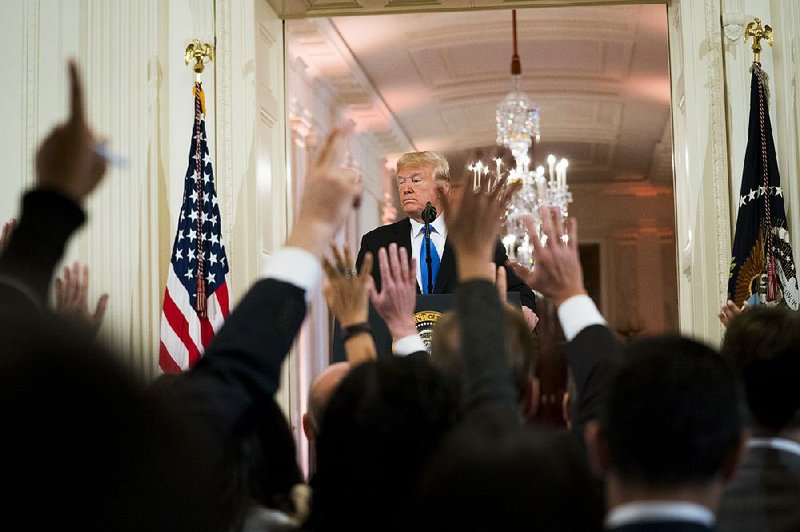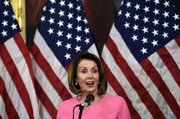WASHINGTON -- President Donald Trump on Wednesday offered to work across party lines with Democrats who won control of the House in midterm elections, but he threatened to retaliate if they use their newfound power to investigate his financial and political dealings.
"There are many things we can get along on," Trump said during a news conference at the White House. "I would like to see bipartisanship. I would like to see unity. Maybe not on everything, but I think we have a very good chance of seeing that."
Praising Rep. Nancy Pelosi of California, the House Democratic leader, Trump said he thought he could make deals with her and her caucus on issues such as health care, the environment and infrastructure, including new roads. In some ways, he said, it might be easier to get things done than if Republicans kept a narrow hold on the House.
But he said he would fight fire with fire if Democrats follow through on their vows to use the subpoena power that will come with the House majority to demand the release of his tax returns and reopen the chamber's investigation into any interactions between Trump's campaign and Russia during the 2016 campaign. He said he would adopt a "warlike posture" and get the Senate Republicans to investigate the Democrats.
"They can play that game, but we can play better because we have a thing called the United States Senate, and a lot of questionable things were done between leaks of classified information and many other elements that should not have taken place," he said.
Senate Majority Leader Mitch McConnell, R-Ky., cautioned Democrats against engaging in "presidential harassment" in the form of overly aggressive oversight.
McConnell drew on the example of the 1998 midterms, which came shortly after Republicans had begun impeachment proceedings against then-President Bill Clinton. The party focused heavily on Clinton's fitness for office but lost congressional seats.
"The Democrats in the House will have to decide just how much presidential harassment is good strategy. I'm not sure it will work for them," he told reporters Wednesday.
At her own news conference, Pelosi credited the Democratic victory in the House to the party's focus on health care issues. She said Democrats have a "responsibility for oversight" but that committees' efforts would not be "scattershot."
"We'll know what we are doing, and we'll do it right," she said.
Pelosi said she had worked productively with President George W. Bush on taxes and other issues when she was speaker a decade ago, and she welcomed the chance to do so again with Trump.
"We'd like to work together so our legislation will be bipartisan," she said.
Still, Pelosi said Democrats weren't elected to be "a rubber stamp" for Trump.
Jockeying for House leadership positions began in earnest Wednesday, though lawmakers are not due back in Washington until next week. Pelosi is widely considered to be the front-runner to retake the speaker's gavel, though dozens of Democratic candidates have in the past called for new leadership.
Trump threw his support behind Pelosi for House speaker and even volunteered Republican votes if she cannot muster enough in her own caucus.
"In all fairness, Nancy Pelosi deserves to be chosen Speaker of the House by the Democrats," he wrote on Twitter. "If they give her a hard time, perhaps we will add some Republican votes. She has earned this great honor!"
On the Republican side, House Freedom Caucus Chairman Jim Jordan of Ohio said in an interview that he would challenge Rep. Kevin McCarthy of California for the role of minority leader. The move, while expected, underscored conservatives' desire to expand their power within the GOP conference after a bruising election.
House GOP leadership elections are scheduled for Nov. 14.
TRUMP UPBEAT
Trump downplayed the Democratic takeover of the U.S. House and argued that his party "defied history" with Republican gains in the Senate, saying the GOP "dramatically outperformed historical precedents" in the midterm election despite a series of retirements by Republican members of Congress.
Trump had every reason to feel good about the results in the Senate. Republicans knocked off three Democratic incumbents -- in Indiana, North Dakota and Missouri -- and were leading in Florida, while losing only one of their own seats, in Nevada. If they hold on to their current leads, Republicans will increase their majority in the upper chamber from 51 seats to 54, giving them far more maneuvering room as they confirm judges and other appointments by Trump.
But the president was quick to distance himself from his party's failure to maintain control of the House.
"Candidates who embraced our message of lower taxes, low regulation, low crime, strong borders and great judges excelled last night," said Trump. "On the other hand, you had some that decided to, 'Let's stay away. Let's stay away.' They did very poorly. I'm not sure that I should be happy or sad, but I feel just fine about it."
Before the election, Trump said that any candidates he backed would win. Among the 76 Republican candidates for House, Senate and governor whom Trump endorsed on Twitter and whose races have been called, there were mixed results. Forty-four had been declared winners and 32 had lost.
In some cases, Trump endorsed insurgent Republicans in primary elections only to see them lose in upsets to Democrats. Trump boasted of the power of his endorsement to help Kansas Secretary of State Kris Kobach win the gubernatorial primary in that state over incumbent Gov. Jeff Colyer.
Kobach, a strong Trump ally, lost his race Tuesday to Democrat Laura Kelly.
Some candidates who tied themselves to Trump and his policies were ousted from office despite his endorsement. Republican Rep. Dave Brat, who voted for Trump's tax cuts and health care bill, lost his re-election bid in a traditionally Republican district in Virginia.
"Congressman @DaveBratVA7th is a fighter who is doing a great job for Virginia and for our Country," Trump tweeted on Oct. 29. "Border, Military, Vets, 2nd Amendment and all else. We need Dave in D.C. He has my Strong Endorsement!"
Wisconsin Gov. Scott Walker also lost his re-election bid after campaigning with Trump. His loss was part of a string of Republican defeats in parts of the Midwest. Democrats won races for governor and Senate in Michigan, Pennsylvania and Wisconsin -- states that helped propel Trump to the presidency in 2016.
The loss of the House is a major blow to the president, whose party until now controlled all the levers of power in Washington and still had trouble passing some of his top legislative priorities other than tax cuts. As of Wednesday morning, Democrats had picked up 26 seats, with 23 races still to be called.
A Democratic House not only can block Trump's priorities, such as building a wall along the southern border, but it can also use subpoena power to investigate issues that he had been protected from until now.
Among other things, House Democrats are prepared to open investigations of Trump and to closely scrutinize his policies on immigration, education and health care. But they are wary of immediately pursuing impeachment, concerned that such a move would undermine lawmakers who represent districts that Trump won in 2016.
Democrats also could demand the release of tax returns that Trump has kept secret, look into his business dealings and reopen the House investigation into any ties between Trump's team and Russia during the 2016 presidential election.
"We'll fill in the gaps on the Russia investigations," Rep. Eric Swalwell, D-Calif., a member of the House Intelligence Committee, said Wednesday on NBC News. "The American people will see his tax returns, not because of any voyeuristic interest, but because they should know if he is corrupt. And we will look at the cashing in of access to the Oval Office -- and that has been concerning -- and his financial entanglements overseas."
Information for this article was contributed by Peter Baker and Eileen Sullivan of The New York Times; by Toluse Olorunnipa and Mike Dorning of Bloomberg News; by Philip Rucker, Matt Viser, Elise Viebeck, Isaac Stanley-Becker, Philip Bump, Scott Clement, Karoun Demirjian, David A. Fahrenthold, Amy Gardner, Anne Gearan, Emily Guskin, Paul Kane, Beth Reinhard and John Wagner of The Washington Post; and by Jonathan Lemire, Catherine Lucey, Darlene Superville, Deb Riechmann, Eric Tucker and Matthew Daly of The Associated Press.
A Section on 11/08/2018


